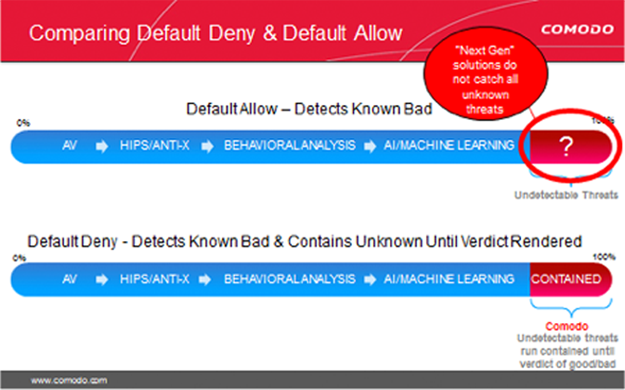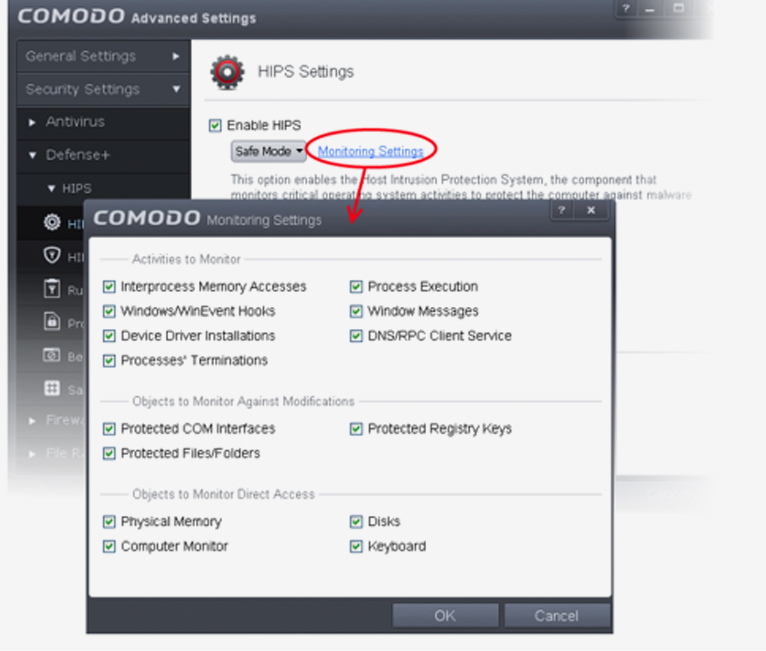Endpoint Threat Prevention




 (1 votes, average: 5.00 out of 5)
(1 votes, average: 5.00 out of 5)While no security vendor can stop zero-day malware from entering your network, Xcitium can prevent you from becoming patient zero. Conventional and automated next-generation security solutions rely on detection and therefore, will not detect unknown threats. Their solutions run on Default Allow platforms. This is risky because by default, they “allow” any file they don’t detect unfettered access to your endpoints, including unknown malware.
In contrast, Xcitium’s Default Deny Platform runs a default deny posture that prevents unknown files (zero day) from accessing the host. Instead, they run in a lightweight container—CPU-enforced OS Virtualization—on the endpoint with negligible impact on performance. Xcitium’s Secure Auto Containment™ prevents infections from new malware.
FREE TRIAL CONTACT FOR DEMO
Compare Postures:
Default Allow versus Default Deny
Only Xcitium can deliver maximum security and usability with a Default Deny posture that prevents infection and the resulting damage with Secure Auto Containment combined with extensive detection and response capabilities.

Secure Auto Containment with CPU Enforced OS Virtualization
Xcitium Secure Auto Containment™ provides full endpoint protection by creating a secure container (sandbox) where all unknown files or applications can be used and analyzed. While the unknown file is in the container, in CPU enforced OS virtualization, users can run the file or application safely until Valkyrie, Xcitium’s cloud-based analysis system delivers a trust verdict of good or bad. Good files are allowed to run on the endpoint and bad files are eliminated.
Threat intelligence (first signature) is shared immediately across the enterprise to prevent infection at other threat vectors. As well, signature lists—application whitelisting and malware blacklisting—are dynamically updated as trust verdicts convert unknown files to known.
Xcitium OS virtualization technology is extremely lightweight, has no CPU dependencies and is completely application agnostic. Malware or any other unknown process entering this virtualized environment cannot modify the hard disk, registry, or COM interface; therefore, containing any unknown risk.
- Prevents infection across the network from Web, email, documents, USBs and any executable files
- Defeats known and unknown malware ranging from viruses to trojans, from zero-day malware to advanced persistent threats on patched or unpatched machines
- 100% compatible with old or new CPUs, whether the user is on or off the corporate network.

Along with Secure Auto Containment and Self Protection, the Host Prevention Intrusion System (HIPS) is another layer of defense that makes up Xcitium Advanced Endpoint Protection.
Xcitium Advanced Endpoint Protection provides several levels of Host Intrusion Prevention, incorporating signature, baseline and stateful inspection to prevent malware from executing in the enterprise environment. The HIPS layer looks for deviations from normal or baseline states in bandwidth, protocol usage and ports. Stateful inspection provides visibility of the actual protocols contained in the data packets traversing the network and endpoint.
If HIPS detects an abnormal state, it alerts the user or administrator and follows a predetermined set of actions to prevent the endpoint from being compromised.
- Protects against root-kits, inter-process memory injections, key-loggers and more
- Monitors the activities of all applications and processes on your computer and allows executables and processes to run if they comply with the prevailing security rules
- Blocks the activities of malicious programs by halting any action that could cause damage to operating system, system-memory, registry keys or personal data
Advanced HIPS Monitoring Settings

In addition, Xcitium too does behavioral assessment with our host interruption prevention system (HIPS) in conjunction with behavioral analysis / AI / machine learning feature sets at the endpoint and within the cloud. This is needed to identify Advanced Persistent threats (APTs) that will contain routines that attempt to determine in the event that they are in virtualization (a sandbox) or check for fingerprints of specific security vendors’ sandbox situations. In the event that the Apt code detects a sandbox, it won’t run its malicious execution way and can persist.
- Authenticates the integrity of every program before allowing it to load into your computer’s memory
- Performs Cloud Based Behavior Analysis for immediate identification of Malware
- Alerts you every time an unknown or untrusted applications attempts to run or install
- Blocks Viruses, Trojans and Spy-ware before they can ever get onto your system
- Prevents unauthorized modification of critical operating system files and registry entries
- Includes auto-sandbox feature to completely isolate untrusted files from the rest of your computer
Improving Your Posture
Default Deny Security with Default Allow Usability
Since the default allow posture is the underlying problem, we need to flip an organization’s overall security posture to Default Deny to eliminate malware threats.
Xcitium’s breakthrough security allows the known good, blocks the known bad and contains the unknown until a verdict can be determined.
Productivity is assured, and no malware runs on your endpoints.
Your endpoints are 100% malware-free with a viable Default Deny Security Posture. You can manage and protect any device, whether it’s on or off your company network with Xcitium™ Advanced Endpoint Protection.
Endpoint Self Protection from
Disabling Malware
Your enterprise security solution will be rendered useless if it can’t protect itself against critical process termination. Malware authors know this and will try to disable security to enter your environment.
Viruses and Trojans (ransomware) often try to disable your computer’s security applications so that they can operate without detection. Xcitium Advanced Endpoint Protection secures its own registry entries, system files and processes so malware can never shut it down or sabotage the installation.
Xcitium Advanced Endpoint Protection has the strongest “Self-Protection” of any security software, providing continuous protection of itself as well as the subsystem it relies on, as well as constant monitoring and protection of the operating system and all trusted applications.